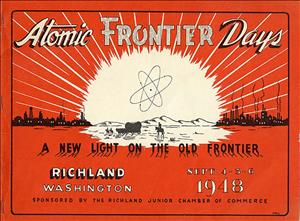On July 15, 1958, Richland votes to incorporate as a first-class city. Richland has been entirely government-owned since 1943 when the town and a vast surrounding area were condemned by federal order to build the Hanford Engineer Works, a secret atom-bomb project. The city has been moving slowly toward self-government for almost 10 years, but previous votes have failed. Finally, the incorporation vote passes by 2,932 to 724, paving the way for incorporation as a first-class city on December 10, 1958.
A Government Town
Since 1943, Richland had been one of the most unusual cities in the country: A "company town," in which the "company" was the federal government. When the Hanford project started in 1943, the original town of Richland was condemned and the government immediately began building a new town to hold 17,000 Hanford workers, complete with homes, sewers, schools, and shopping centers. Virtually everything was owned by the government, even the furnishings in the new houses.
After the war ended, there had been some sentiment toward self-government. Yet until 1958, previous votes had failed because many residents liked the advantages of having the government take care of everything.
"When the town was government-owned and something went wrong, the Richlander merely called GE (General Electric, the government's main contractor) and had it fixed," reported a 1962 story in the Spokane Spokesman-Review. "One longtime resident even went so far as to say if a lawnmower broke he merely would call GE to have a new one delivered" (Fischer).
A Regular Community
But in 1955, the U.S. Congress passed a bill calling for the transfer of government control in Richland and in Oak Ridge, Tennessee, within five years.
As it turned out, the transition to independent city went relatively smoothly. Every person renting a government home or apartment had first option on purchasing it. There were initial complaints about high appraisals, but many of those problems were resolved. Most people ended up with house payments about the same as their government rent.
In 1962, a Richland barber told a reporter that "going from a government town to a regular community has made no difference as far as I'm concerned." He said that Richland was a "booming community" when he arrived a decade earlier "and it still is" (Fischer).

